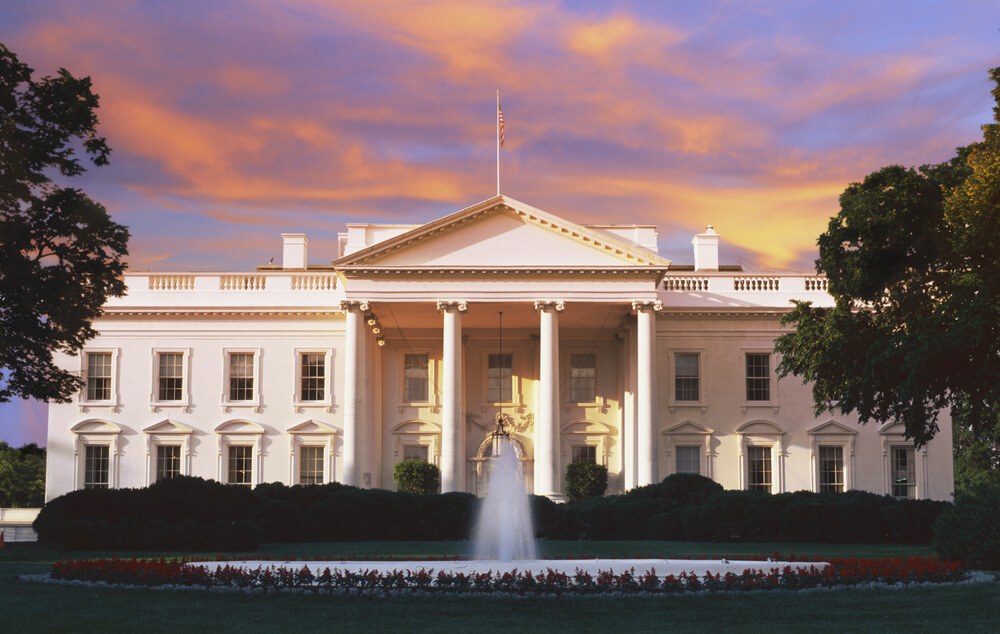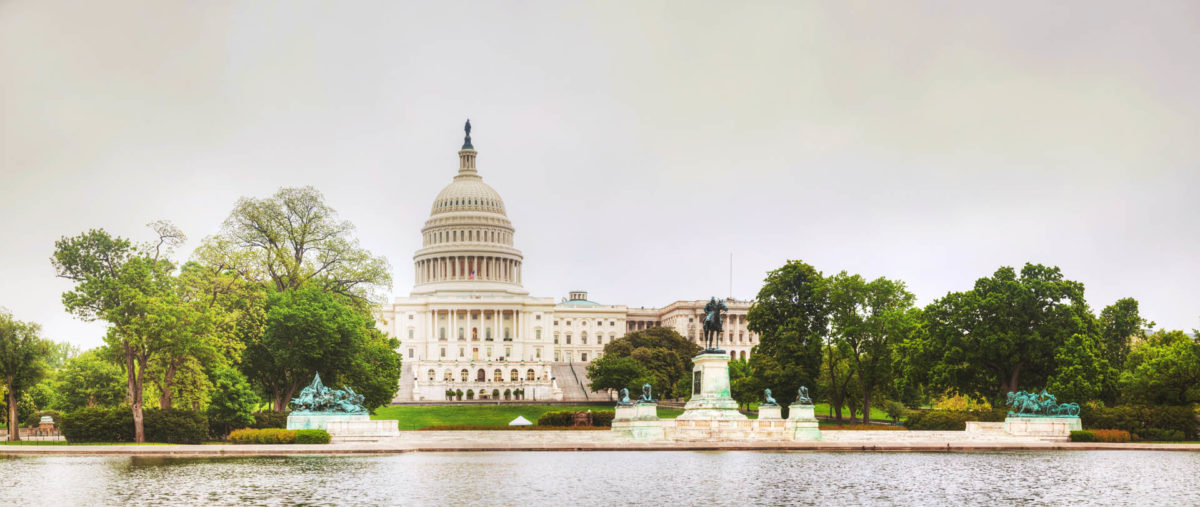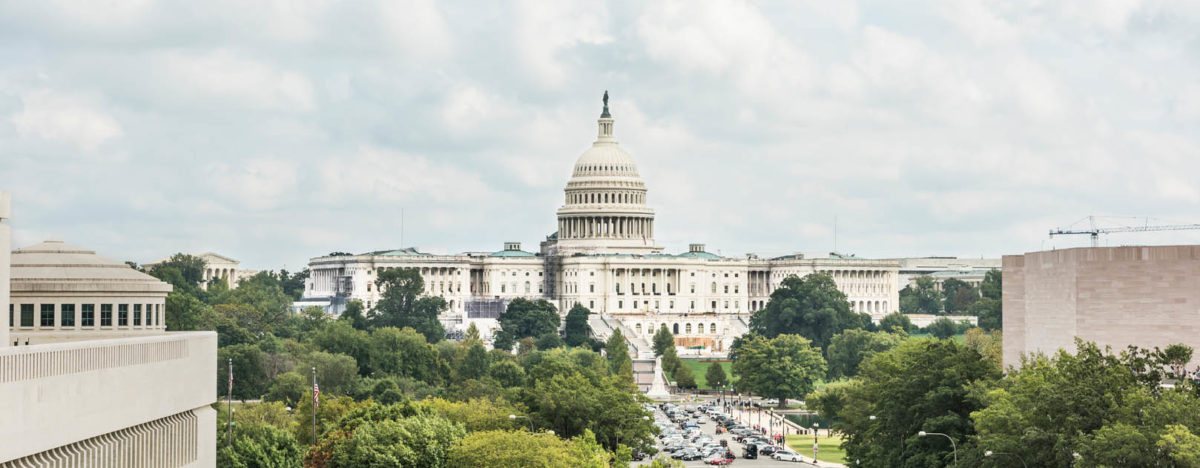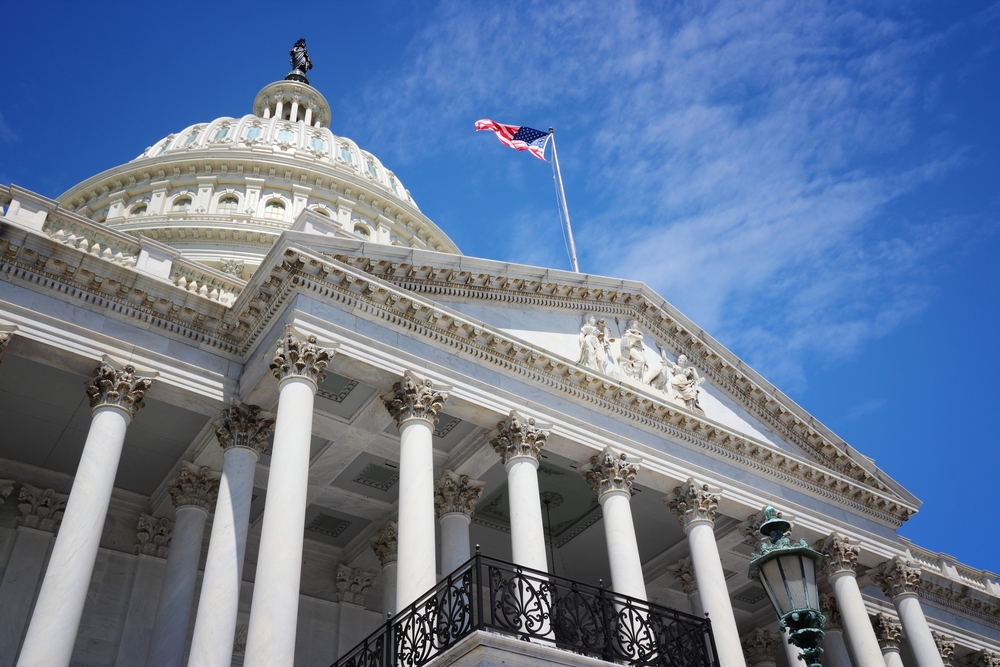Bill to End Federal Cannabis Prohibition and Repair Harms Reintroduced in U.S. House

MORE Act – first approved in December floor vote – would remove cannabis from list of controlled substances, expunge federal convictions, provide resources to small businesses and impacted communities
WASHINGTON, D.C. – The Marijuana Opportunity, Reinvestment, and Expungement (MORE) Act, which would remove cannabis from the federal Controlled Substances Act and attempt to undo the damage caused by racially and economically disproportionate enforcement of prohibition, was reintroduced in the House of Representatives today. An earlier version of the bill was passed in December in a largely party-line vote, becoming the first comprehensive cannabis policy reform legislation to receive a floor vote or be approved by either chamber of Congress.
The MORE Act, sponsored by House Judiciary Chairman Jerrold Nadler (D-NY), would make cannabis legal at the federal level by removing it from the Controlled Substances Act and eliminating the conflict between federal law and states with regulated cannabis systems, and would require the expungement of past federal cannabis convictions. The bill would establish a Cannabis Justice Office to administer a program to reinvest resources in the communities that have been most heavily impacted by prohibition, funded by a graduated tax on state-legal cannabis commerce. It would also prevent discrimination based on cannabis consumption during immigration proceedings, and permit doctors within the Veterans Affairs system to recommend medical cannabis to patients in accordance with applicable state laws.
The MORE Act has not been reintroduced in the Senate yet, but Majority Leader Chuck Schumer (D-NY) has made cannabis policy reform a priority for the upper chamber this year, and is expected to introduce separate comprehensive descheduling and restorative justice legislation with Sens. Cory Booker (D-NJ) and Ron Wyden (D-OR) in the near future.
“The House has the opportunity to double down on its commitment to justice and economic recovery this year by taking up the MORE Act immediately and continuing the robust debate on how to best end the disastrous federal war on cannabis,” said Aaron Smith, co-founder and chief executive officer of the National Cannabis Industry Association (NCIA). “Given the rapidly growing number of states with legal cannabis markets and the steadily increasing support from voters across the political spectrum, we expect there could be even more support for ending the failed federal prohibition in this session.”
Revisions from the version passed by the House in December include the removal of a provision that was added shortly before the successful floor vote that would have allowed federal regulators to deny cannabis business licenses to applicants who have prior felony convictions. It would also include provisions to allow the Small Business Administration to provide loans and technical assistance directly to cannabis-related businesses and support state and local equity licensing programs and put added emphasis on assisting people who have been most impacted by prohibition in succeeding in any industry.
However, advocates are concerned about the lack of a strong and comprehensive regulatory structure being included in the introductory language.
“In order to create a federal structure that is narrowly tailored to the unique characteristics of the cannabis industry and helps ensure fair opportunities for marginalized communities, innovation and stakeholder engagement are absolutely vital,” continued Smith. “We need to move beyond the alcohol and tobacco models and incorporate the lessons learned in legal cannabis markets if we want to create a regulatory environment where small businesses can truly thrive and which will start to repair the disparate harms caused by nearly a century of prohibition. We look forward to continuing our work with lawmakers on both sides of the aisle to further develop this legislation and continue the momentum that has been building since the House first voted to deschedule cannabis.”
A recent Gallup poll showed a record 68% of Americans support making cannabis legal. On Election Day, voters in Arizona, Montana, and New Jersey approved measures to regulate cannabis for adults, while Mississippians overwhelmingly approved a medical cannabis referendum and voters in South Dakota passed both adult use and medical initiatives. The Mississippi Supreme Court recently invalidated the popular medical initiative due to an outdated technicality, and voters and advocates in South Dakota await a final ruling by that state’s highest court on a similar challenge to the approved adult use ballot initiative.
So far in 2021, the states of New Mexico, New York, and Virginia have all passed laws regulating cannabis for adults, and Alabama approved a medical cannabis bill earlier this month. Dozens of states are considering cannabis policy reform legislation this year.
Cannabis is now legal for adults in 17 states as well as the District of Columbia and the territories of CNMI and Guam, and 36 states as well as several territories have comprehensive medical cannabis laws. The substance is legal in some form in 47 states.
###
SAFE Banking Act Passed by House of Reps. Again in Bipartisan Vote

Legislation would allow state-legal cannabis businesses fair access to financial services
Today is fourth time the House has approved cannabis banking reform
WASHINGTON, D.C. – The House of Representatives approved legislation again today that would provide safe harbor for financial service providers to work with cannabis businesses that are in compliance with state laws. The Secure and Fair Enforcement (SAFE) Banking Act, or H.R. 1996, was reintroduced in March by Reps. Ed Perlmutter (D-CO), Steve Stivers (R-OH), Nydia Velazquez (D-NY), and Warren Davidson (R-OH), and had 177 total cosponsors by the time of the vote. The legislation was approved by a vote of 321-101, including a majority of voting Republicans.
This is the fourth time that the House has approved the language of the SAFE Banking Act, initially as the first standalone cannabis policy reform bill ever passed by either chamber of Congress in 2019 and two more times last year as part of pandemic relief packages that were not approved in the Senate.
“We are incredibly grateful to the bill sponsors who have been working with us for the last eight years to make this sensible legislation become law and have shepherded it through the House time and again,” said Aaron Smith, co-founder and chief executive officer of the National Cannabis Industry Association. “The SAFE Banking Act is vital for improving public safety and transparency and will improve the lives of the more than 300,000 people who work in the state-legal cannabis industry. It will also help level the playing field for small businesses and communities with limited access to capital. It is time for the Senate to start considering the companion legislation without delay.”
Advocates are hopeful that Senate Banking Committee Chair Sherrod Brown (D-OH) will take up the bill in the near future so that it can begin to move through the upper chamber as soon as possible and become law before the end of the year.
The SAFE Banking Act would protect financial institutions from federal prosecution for providing banking and other services to cannabis businesses that are in compliance with state law, as well as help address serious public health and safety concerns caused by operating in predominantly cash-only environments. The legislation would improve the operational viability of small businesses by helping them reduce costs associated with lack of access to banking and increasing options for traditional lending that many small businesses in other fields rely upon. It would also mandate a study on diversity in the cannabis industry.
Laws making cannabis legal for adults have been passed in 18 states as well as the District of Columbia and the territories of CNMI and Guam, and 36 states as well as several territories have comprehensive medical cannabis laws. The substance is legal in some form in 47 states.
###
New York Becomes Latest State to Regulate Cannabis for Adults

With nearly 40% of Americans now living in states with adult use cannabis laws, advocates call for federal reform
WASHINGTON, D.C. – On Wednesday, New York became the 16th state to approve a law creating a regulated adult use cannabis market when Gov. Andrew Cuomo signed the Marijuana Revenue and Taxation Act (MRTA). This legislation would make possession of up to three ounces and limited home cultivation legal and will automatically expunge convictions for behavior that is legal under the new law.
Nearly 60,000 people – the majority of whom are people of color – are arrested for marijuana violations in New York every year, the effects of which can permanently damage their ability to obtain employment, housing, and education, among other collateral consequences.
A 2020 report by Arcview Market Research and BDSA projected that the New York cannabis market will be worth more than $1.6 billion by 2025. The state plans to tax cannabis at 9%, with additional incremental taxes levied based on the type of product and the amount of THC contained in them. Forty percent of the revenue generated will be reinvested in communities that have been disproportionately harmed by cannabis prohibition. A 2019 report from the SUNY Rockefeller Institute of Government estimated that the legal cannabis market in New York will create more than 30,000 jobs.
Roughly 40% of the United States population now lives in states that have passed adult use cannabis laws.
“We commend Empire State lawmakers for aligning state law with the will of the vast majority of voters who support legal and regulated cannabis markets as an alternative to failed prohibition,” said Aaron Smith, co-founder and chief executive officer of the National Cannabis Industry Association (NCIA). “We are rapidly approaching a point where a majority of Americans will be living in states that have passed laws to regulate cannabis for adults, and we’re counting on Congress and the White House to finally harmonize federal law with these successful state programs.”
Cannabis industry advocates are hopeful that this move will lead to accelerated progress throughout the region. Voters in New Jersey overwhelmingly approved an adult use measure at the ballot box last year and the governors or legislatures of Connecticut, Delaware, Pennsylvania, and Rhode Island have prioritized comprehensive cannabis policy reforms in 2021.
Cannabis is now legal for adults in 16 states as well as the District of Columbia and the territories of CNMI and Guam, and 36 states as well as several territories have comprehensive medical cannabis laws. The substance is legal in some form in 47 states. Virginia Gov. Ralph Northam is awaiting legislative approval for amendments to the adult use legislation that was passed earlier this year and is expected to sign the bill into law soon. Dozens of other states are considering cannabis policy reform measures this year.
###
SAFE Banking Act Reintroduced in Senate

Bipartisan measure to improve public safety, transparency, and access to capital would protect financial institutions working with state-legal cannabis businesses
WASHINGTON, D.C. – On Tuesday, a bipartisan group of lawmakers reintroduced the Secure and Fair Enforcement (SAFE) Banking Act in the U.S. Senate. This legislation, which was introduced by Sens. Jeff Merkley (D-OR) and Steve Daines (R-MT) along with 27 original cosponsors, would protect banks and other financial institutions from federal prosecution simply for providing services to cannabis businesses that are operating in compliance with state laws.
Due to the threat of federal penalties and costly reporting requirements, most financial services companies will not work with state-legal cannabis businesses, forcing the majority of the regulated industry to operate on a cash-only basis. This creates numerous public safety and transparency issues for the industry, law enforcement, government officials, and other service providers, and has led to cannabis businesses being increasingly targeted by criminals with sometimes fatal results.
“No one working in a store or behind a register should have to worry about experiencing a traumatic robbery at any moment,” said Sen. Merkley. “That means we can’t keep forcing legal cannabis businesses to operate entirely in cash – a nonsensical rule that is an open invitation to robbery and money laundering. Let’s make 2021 the year that we get this bill signed into law so we can ensure that all legal cannabis businesses have access to the financial services they need to help keep their employees safe.”
Providing a safe harbor for financial service providers to work with cannabis businesses would also allow for traditional lending, which is currently unavailable to almost all of the industry. This lack of access to capital most adversely affects small businesses and marginalized communities that are trying to break into the industry and thrive in the absence of generational wealth and deep financial networks.
Companion legislation was reintroduced in the House last week. It was first passed in that chamber in a historic floor vote with overwhelming bipartisan support in September 2019, and was included in the language of two subsequent House-approved pandemic relief bills in 2020. The Senate version stalled under the leadership of then-Senate Majority Leader Mitch McConnell (R-KY) despite bipartisan sponsorship prior to the pandemic, which de-prioritized stand-alone cannabis legislation in that chamber.
There are currently 72 senators representing states with comprehensive medical or adult use cannabis laws and whose constituents would directly benefit from passage of the SAFE Banking Act, including 25 Republicans.
“With new Senate leadership now firmly in favor of cannabis policy reform, we are optimistic that this narrowly tailored – but absolutely necessary – legislation will be allowed to progress through the hearing process without delay,” said Aaron Smith, co-founder and chief executive officer of the National Cannabis Industry Association (NCIA). “This bill is a meaningful first step that will have immediate benefits in terms of safety, transparency, fairness, and much-needed economic opportunities while Congress continues working toward more comprehensive solutions to end prohibition and sensibly regulate cannabis.”
Cannabis is legal for adults in 15 states as well as the District of Columbia and the territories of CNMI and Guam, and 36 states as well as several territories have comprehensive medical cannabis laws. The substance is legal in some form in 47 states. Virginia is poised to become the 16th state – and the first in the South – to regulate cannabis for adults after its lawmakers sent legislation to Gov. Ralph Northam for approval last month.
###
NCIA Announces New Evergreen Membership Tier for Policy-Oriented Business Leaders

WASHINGTON, D.C. – In order to amplify its efforts on Capitol Hill during this pivotal time, and to provide leading industry members a front row seat to the end of prohibition and the opportunity to play an active role in shaping the future of cannabis in the U.S., the National Cannabis Industry Association (NCIA) is announcing the all-new Evergreen membership tier, suited for industry leaders looking for a more hands-on experience in the effort to reform national cannabis policy.
In addition to all the networking and educational benefits NCIA is uniquely known to provide members, Evergreen-level supporters will also have more enhanced opportunities to engage in NCIA’s government relations and public policy work, including:
- Private briefings and events with our lobbying team and key members of Congress
- Input into all NCIA public policy positions
- Exclusive meetings with congressional offices arranged by request
- Invitation to participate in NCIA’s private Policy Summits with state regulators and policymakers
- And many more opportunities to shape the future of national cannabis policy
“For over a decade, NCIA has fought for the best interests of all players in the cannabis business community and I’m proud that we continue to be the most broadly representative voice for the industry,” said Aaron Smith, co-founder and chief executive officer of NCIA. “In order to better serve the needs of the changing industry, we are pleased to announce the new Evergreen membership tier which provides an opportunity for industry leaders to make a significant investment in reform efforts to benefit all cannabis businesses while playing a greater role in crafting federal policy and regulations that will impact our industry for generations to come.”
“Influencing important new and inclusive cannabis policies is at the heart of the Evergreen membership,” said Seun Adedeji, chief executive officer and founder of Elev8 Cannabis, and NCIA board member. “What an exciting time to be one of its first members.”
In addition to the enhanced presence in our nation’s halls of power, Evergreen members receive direct ROI from a full slate of unparalleled membership benefits worth more than $75,000 in total value but dues are only $25,000 annually (monthly and quarterly payment plans are also available). Beyond adding to NCIA’s federal policy work, Evergreen memberships also help support efforts like the Social Equity Scholarship Program and other work to promote a fair and inclusive cannabis industry.
There is no better time for a business in the cannabis space – whether plant-touching or an ancillary service provider – to become a member of NCIA to help drive the changes the industry needs to truly thrive.
###
NCIA Critical of White House for Punishing Employees Over Past Cannabis Consumption

WASHINGTON, D.C. – An article published in The Daily Beast today reports that the Biden Administration has suspended, transferred, or requested the resignations of numerous employees in various White House roles, predominantly younger people for whom state-legal cannabis programs have been a reality for a significant portion of their lives. This includes Washington, D.C., where cannabis has been legal to possess and cultivate since 2014.
Recent guidance from the Office of Personnel Management advised federal employers not to view past cannabis use as an automatic disqualifier for otherwise qualified job candidates. President Biden has expressed support for decriminalizing cannabis both before and after the election. Vice President Harris has publicly supported legalizing and regulating cannabis, and was the lead Senate sponsor of the MORE Act in the last Congress, which would remove cannabis from the schedule of controlled substances.
“While we may not know all the details of these cases, this looks really bad for the White House,” said Aaron Smith, co-founder and chief executive officer of the National Cannabis Industry Association. “Punishing current and potential employees for past cannabis use, particularly under circumstances where it was protected by state laws, flies in the face of the Administration’s purported emphasis on fairness and sensible cannabis policies, to say nothing of its very recent guidance to federal agencies in this area. At the very least, this sends the wrong message to federal personnel managers, as well as policymakers and employers across the country.”
“Three of the last five presidents – including the current president’s former boss – have admitted to consuming cannabis,” Smith continued. “The idea that past use would make a person unfit for service in the White House or ineligible for a security clearance is laughable.”
Cannabis is legal for adults in 15 states as well as the District of Columbia and the territories of CNMI and Guam, and 36 states as well as several territories have comprehensive medical cannabis laws. The substance is legal in some form in 47 states. Cannabis policy reform legislation is being considered in dozens of states this year, and lawmakers in Virginia recently approved a bill to legalize and regulate adult use.
###
SAFE Banking Act Reintroduced in House of Representatives

Bipartisan bill would remove barriers for financial institutions to work with state-legal cannabis businesses
House passage expected after being approved three times since 2019
WASHINGTON, D.C. – The Secure and Fair Enforcement (SAFE) Banking Act was reintroduced in the House of Representatives today. This bill, which was introduced by Reps. Ed Perlmutter (D-CO), Steve Stivers (R-OH), Nydia Velazquez (D-NY), and Warren Davidson (R-OH), would provide a safe harbor for banks and other financial institutions working with state-legal cannabis businesses.
In the last Congress, this legislation was the first cannabis policy reform bill brought to the floor of the House in recent history – with 206 co-sponsors – and was the first to be approved by either chamber of Congress with an overwhelming bipartisan vote of 321-103 in September 2019. The bill moved to the Senate but consideration in that chamber was delayed due to the onset of the coronavirus pandemic. The House also approved two separate pandemic relief bills last year that included the legislation’s language.
“Thousands of employees and businesses across this country have been forced to deal in piles of cash for far too long,” said Rep. Perlmutter. “It is time to enact SAFE Banking to align federal and state laws and reduce the public safety risk in our communities. I appreciate the partnership of the cannabis industry and businesses across this country who have added their voice to this effort. The SAFE Banking Act is an important first step to treating cannabis businesses like legal, legitimate businesses and beginning to reform our federal cannabis laws.”
The SAFE Banking Act would protect financial institutions from federal prosecution for providing banking and other services to cannabis businesses that are in compliance with state law, as well as help address serious public health and safety concerns caused by operating in predominantly cash-only environments. The legislation would make traditional lending more accessible for the cannabis industry, helping alleviate the lack of access to capital that has presented major hurdles for smaller businesses. It would also mandate a study on diversity in the cannabis industry. The latest version makes clear that protections would extend to financial services providers working with the hemp industry as well.
“At a time when small businesses need all the support they can get, and after cannabis businesses specifically have been providing essential services and generating significant tax revenues for states and the federal government with little to no financial relief, it is more imperative than ever to get the SAFE Banking Act passed into law,” said Aaron Smith, co-founder and CEO of the National Cannabis Industry Association (NCIA). “Lack of access to banking services continues to create serious unnecessary issues for public safety, transparency, and access to traditional lending that smaller operators desperately need. These businesses are contributing billions of dollars to the national economy every year, and need to be treated like any other legal regulated industry. We are grateful to the sponsors of this legislation who have generated strong and consistent bipartisan support year after year, and we are confident that it has a clear path to approval again.”
Cannabis is legal for adults in 15 states as well as the District of Columbia and the territories of CNMI and Guam, and 36 states as well as several territories have comprehensive medical cannabis laws. The substance is legal in some form in 47 states. Virginia is poised to become the 16th state to pass adult use legislation when Gov. Ralph Northam signs a bill approved by the legislature into law.
###
NCIA Decries Potency Caps, Home Cultivation Bans

Trade group opposes recent state and federal proposals that would endanger consumers and limit benefits of regulated markets
WASHINGTON, D.C. – In response to recent proposals at both the state and federal level to ban limited home cannabis cultivation and place caps on the percentage of THC allowed in regulated products, the National Cannabis Industry Association (NCIA) is joining a growing chorus of advocates and stakeholders in opposing such policies and voicing its concerns that their adoption would create unnecessary public health and safety concerns, and curtail the positive impact that regulation has had in states that have implemented modern cannabis policies.
Earlier this month, the Senate Caucus on International Narcotics Control released a report that recommended placing severe limitations on the amount of THC allowed in regulated products as both chambers of Congress are working on legislation to remove cannabis from the schedule of controlled substances and provide regulatory guidance to states with legal markets. Florida lawmakers are currently considering a bill to impose similar limits on products available through the state’s medical cannabis program. And several states in which adult use cannabis legislation is progressing are entertaining bans on limited home cultivation by adults.
“These misguided efforts are just the latest iteration of a long history of scare tactics used to unfairly stigmatize and criminalize products and behaviors that are far safer when regulated,” said Aaron Smith, co-founder and chief executive officer of the National Cannabis Industry Association. “Cannabis policies should be based on sound evidence and pragmatism rather than fear. We cannot afford to ignore the lessons from our disastrous century-long experiment with prohibition by simply banning things that may present policy challenges.”
Proposed potency caps often seek to limit THC content to levels well below what is common in even some of the lowest potency flowers and concentrates available in regulated markets throughout the country. Sales data in regulated markets show that products above the proposed THC limits continue to be popular with consumers, and scant clinical or epidemiological evidence exists to suggest significant or widespread risk associated with those products for the vast majority of consumers.
Furthermore, the outbreak of THC vaping-related illnesses at the end of 2019 – in which the vast majority of cases were tied to unregulated and untested products – illustrates both the continued availability and potential harms associated with unregulated products, as well as the willingness of some cannabis consumers to obtain them even in places where regulated options exist. This is particularly true if regulated providers do not exist or are unable to effectively compete with the unregulated market on consumer price or product options because of onerous regulatory limitations.
Potency caps on regulated products would likely send many more consumers to the unregulated market. This presents public health and safety concerns above and beyond those directly facing consumers. Increased demand for unregulated high-potency cannabis concentrates will certainly lead to an increase in unsupervised and clandestine manufacture of those products. The volatile chemicals and high degree of expertise necessary to safely process many cannabis concentrates makes unregulated production extremely dangerous, and illegal processing operations have been linked to numerous fires and explosions throughout the country.
It should also be noted that Marinol, the first FDA-approved cannabinoid pharmaceutical drug, is nearly 100% THC and is still regularly prescribed by doctors in the United States.
“If the intent of lawmakers and regulators is to protect consumer health and safety, we need to enact sensible policies to manage the full gamut of existing cannabis products, as many states have already done successfully,” said Smith. “If we can effectively regulate high-proof alcohol, which – unlike cannabis – is directly tied to tens of thousands of deaths every year, we can do it with cannabis. Potency caps will only serve to endanger consumers and the general public.”
Limited home cultivation is an issue that is becoming more prominent as state legislatures increasingly tackle cannabis policy reform in lieu of voter-driven ballot initiatives, which have almost uniformly supported the legal ability of adults to grow small amounts of cannabis in private residences. Of the 15 states where cannabis is legal and regulated for adults, only Washington, New Jersey, and Illinois do not allow limited home cultivation, though Illinois and Washington have narrow home cultivation exceptions for registered medical cannabis patients.
Lawmakers in Washington – one of the first two states to approve legalization for adults – are currently considering a bill to make home cultivation legal. Adult use legislation that includes home cultivation was recently approved in Virginia, and is awaiting the governor’s signature. However, recent proposals in Connecticut, New York, and Oklahoma have omitted this allowance to the concern of advocates and industry alike.
“Allowing adults to possess and consume cannabis while punishing people who wish to provide it for themselves flies in the face of rationality and justice,” continued Smith. “Just as individuals are allowed to make small amounts of beer at home, so too should cannabis consumers, and history has shown that retaining criminal penalties for such behavior certainly means that enforcement will be disproportionately carried out in marginalized communities. Limited home cultivation also provides an inexpensive and easily accessible way for people to develop skills and experience that can be applied in the legal regulated industry. Without home brewing, the beer industry would still be dominated by a handful of companies, and the robust craft brewing industry would not exist. We cannot allow the same thing to happen in the burgeoning cannabis industry.”
Cannabis is legal for adults in 15 states as well as the District of Columbia and the territories of CNMI and Guam, and 36 states as well as several territories have comprehensive medical cannabis laws. The substance is legal in some form in 47 states. Virginia is poised to become the 16th state to regulate cannabis for adults after its legislature approved legalization legislation this month, which Gov. Ralph Northam is expected to sign.
###
National Cannabis Industry Association Reschedules 2021 Events to Deliver Full Experience

The National Cannabis Industry Association (NCIA) is pleased to announce its new event schedule. To deliver the full, in-person experience for NCIA’s cannabis business events, they have been rescheduled for the second half of 2021.
The Cannabis Business Summit & Expo, originally scheduled for August 3-5, 2021 in San Francisco, will now take place December 15-17, 2021, and will remain at the Moscone Center in San Francisco.
The Midwest Cannabis Business Conference, which was scheduled for August 25-26, 2021 in Detroit, will now take place September 22-23, 2021, and remains at TCF Center.
“While we recognize the inconvenience of a date change, we are confident that this is the best decision for our members, exhibitors, sponsors, and attendees,” said Aaron Smith, Chief Executive Officer of NCIA. “The cannabis industry is a tight-knit community, and we’re dedicated to providing our members with the highest quality and most enriching experiences in 2021. As we continue to navigate the ever-changing landscape and carry on with our cannabis policy reform efforts in Congress, we look forward to making 2021 a pivotal year for NCIA members and our events program.”
As NCIA looks forward to its 2021 cannabis business events, their number one priority is the health & safety of all event participants, in addition to providing a reliably unique and enriching experience for the industry. NCIA will implement health & safety protocols that meet or exceed those set forth by federal, state, and local health departments at all events.
Although the 2021 events have been rescheduled, NCIA continues its advocacy efforts on behalf of cannabis businesses and feels the current state of the legal cannabis industry necessitates the importance of bringing the industry together in 2021. NCIA highlights the fact that in 2020, on the heels of voters in four states approving adult use cannabis measures in November, cannabis became an $18.3 billion industry in the United States and the job market saw a 31% increase in full-time legal cannabis jobs. The appetite for federal reform is stronger than ever with public opinion for legalization ringing in at an all-time high of 68% of Americans.
For more information about any of NCIA’s events, please contact: info@cannabisbusinesssummit.com.
NCIA Welcomes New and Returning Members to Its Board of Directors and Announces Board Officers

WASHINGTON, D.C. – The National Cannabis Industry Association (NCIA), the country’s largest cannabis trade association and industry advocacy organization, will be seating its newly-appointed Board of Directors today.
The organization’s Nominating Committee brought on four new board members. Seun Adedeji is the CEO of multi-state cannabis retailer Elev8 Cannabis with operations in Massachusetts and Oregon, and the youngest African-American dispensary owner in the United States. Kimberly Cargile is the CEO of A Therapeutic Alternative, a California-based cannabis retailer, and a long-time advocate for medical cannabis patients. Rebecca Colett is the CEO of Calyxeum, a licensed cannabis cultivation company based in Michigan, and has years of experience in the legal cannabis industry championing minority inclusion, veteran access programs and workforce development. Cody Stross is the CEO of Northern Emeralds, a cannabis cultivator based in Northern California, and has significant experience in many areas of the cannabis industry as well as being a founding member of a cannabis trade association representing businesses in the Emerald Triangle.
Two incumbent Board members were also re-elected for another term: Kris Krane, current vice-chair of NCIA’s Board of Directors, and president and co-founder of 4Front Ventures; and Taylor West, partner at Heart + Mind Media.
“We are pleased to welcome these new and returning Board members for the next term as we enter what is arguably the most exciting time for cannabis policy reform in history,” said Aaron Smith, co-founder and chief executive officer of the National Cannabis Industry Association. “With their invaluable contributions and insight, NCIA will be well-positioned to improve the legal and regulatory landscape for the cannabis industry, lead it into new frontiers, and continue to be the most broadly representative proponent of cannabis businesses in the United States.”
The full list of Board members and their bios is available here.
Outgoing members include founding Board members Troy Dayton and Etienne Fontan as well as Aaron Justis and Mark Passerini.
“On behalf of myself and the rest of the NCIA community, I want to extend my heartfelt gratitude to the Board members who are relinquishing their positions for their unwavering support of our efforts over the years to end prohibition and help the cannabis industry and its association grow,” said Smith. “We look forward to continuing our work with them in many capacities during this time of unprecedented opportunity.”
The Board also conducted an election to determine the officers for the year at its meeting yesterday. Khurshid Khoja and Kris Krane were re-elected as the Board’s Chair and Vice Chair, respectively. Narbe Alexandrian was re-elected as Treasurer and Chris Jackson was elected to the position of Secretary. Henry Wykowski will continue to serve as the Board’s General Counsel.
###
House of Representatives Approves Bill to Make Cannabis Legal in Historic Vote

WASHINGTON, D.C. – On Friday, the House of Representatives voted 228-164 in favor of the Marijuana Opportunity Reinvestment and Expungement (MORE) Act, which would make cannabis legal at the federal level and work to repair the social and personal harms caused by federal marijuana enforcement. This is the first time since marijuana was made federally illegal that either chamber of Congress has held a floor vote on — or approved — a bill to make the substance legal again.
“The symbolic and historical importance of the MORE Act passing in the House cannot be overstated,” said Aaron Smith, co-founder and chief executive officer of the National Cannabis Industry Association. “This vote stands as a rebuke of failed and harmful prohibition policies, and represents a growing understanding of their racially and economically disparate impacts. Americans are increasingly ready to see cannabis legal for adults and sensibly regulated, which they showed through their representatives today and at the ballot box last month.”
A recent Gallup poll showed a record 68% of Americans support making cannabis legal. On Election Day, voters in Arizona, Montana, and New Jersey approved measures to regulate cannabis for adults, while Mississippians overwhelmingly approved a medical cannabis referendum and voters in South Dakota passed both adult use and medical initiatives.
The MORE Act, sponsored by House Judiciary Chairman Jerrold Nadler (D-NY) and 120 cosponsors, would make cannabis federally legal by removing it from the Controlled Substances Act, and would require the expungement of past federal cannabis convictions. The bill would establish a Cannabis Justice Office to administer a program to reinvest resources in the communities that have been most heavily impacted by prohibition, funded by a tax on state-legal cannabis commerce. It would also allow the Small Business Administration to provide loans and grants to cannabis-related businesses and support state and local equity licensing programs, permit doctors within the Veterans Affairs system to recommend medical cannabis to patients in accordance with applicable state laws, and prevent discrimination based on cannabis consumption during immigration proceedings.
On Monday, a series of amendments were announced that included: changing the tax rate from a flat five percent to a graduated tax of between five and eight percent; giving certain federal agencies the ability to ban cannabis consumption by their employees and licensees and allowing federal workers to be drug-tested for cannabis; and allowing federal regulators the option to limit who can receive cannabis business licenses.
“Overall, this bill is a huge step in the right direction,” Smith continued. “We commend the House for supporting this monumental legislation and look forward to working closely with lawmakers to address some possible improvements, as well as help develop a robust, sensible regulatory framework. There is still much work to do, both on Capitol Hill and in the states.”
The Senate version of the MORE Act, sponsored by Vice President-elect Kamala Harris and seven cosponsors, is unlikely to be taken up in that chamber during the lame-duck session.
Cannabis is legal for adults in 15 states as well as the District of Columbia and the territories of CNMI and Guam, and 36 states as well as several territories have comprehensive medical cannabis laws. The substance is legal in some form in 47 states.
###
NCIA’s Diversity, Equity, and Inclusion Committee Urges Revamp of Illinois Social Equity Licensing Process

Letter sent from committee members to Gov. Pritzker, lawmakers, and regulators calls for more transparency, offers recommendations to maintain legislative intent of program
WASHINGTON, D.C. – This week, the National Cannabis Industry Association’s Diversity, Equity, & Inclusion Committee (DEIC) sent a letter to government officials and regulators in Illinois with analyses and recommendations for improving the state’s cannabis dispensary social equity licensing program. When Illinois became the first state to regulate cannabis through its legislature and include a statewide social equity program for the cannabis industry in the legislation, advocates were hopeful that the state would become a model for improved representation. After the initial results of the first social equity dispensary application period were announced, however, the program has received backlash over lack of transparency, failures in the selection process that favor heavily funded multi-state operators, the extremely limited number of companies that were selected for the final lottery, and the ultimate lack of representation achieved.
“In response to the recent results of the Illinois Adult Use Dispensary application process, we present our findings and recommendations in the interest of diversity, equity, and inclusion for the Illinois cannabis industry,” the letter reads. “To address disparities in the initial results of the process, we believe we must first acknowledge the process was flawed and that the results do not reflect the intent of lawmakers. While well meaning and intentioned, the results have been widely criticized in their limited ability to be inclusive and to truly generate opportunities for restorative justice and economic empowerment for people most harmed by prohibition.”
It goes on to elaborate on a number of critiques about the program, and suggests several ways to improve the system and ensure legislative intent, including but not limited to: complete transparency of the scoring system, methodology, and actions used by the government’s outside contractor, KPMG, in the application process; closer scrutiny of operating agreements to avoid predatory partnerships; and changing the grading rubric to avoid limiting those eligible for the lottery to applicants with perfect scores.
The full letter and analysis can be read here.
Gov. Pritzker, who has touted Illinois as a leader in cannabis regulation and social equity, has directed the Illinois Department of Financial and Professional Regulation to reexamine the application process, hear appeals, and rescore applicants before allowing licensing to proceed. In early November, an Illinois court rejected a request for a restraining order filed by the initial finalists to prevent rescoring the other applications.
“We know from lessons learned in other markets like Los Angeles that the process must reflect the intention and not further highlight the systemic structural barriers to entry that favor the monied,” said Yarrow Kubrin, founder of Special Teams Consulting and Folsom Forge and vice-chair of the DEIC. “Further, we as a people expect taxpayer money to include a level of accountability with respect to the state’s actions and services provided to it by outside contractors. If the state doesn’t hold itself and its contractors accountable, how can it expect an entire industry to be accountable? We have waited years for effective state-level social equity programs, and doing it better is not something that should be kicked down the road or merely applied to subsequent application processes. As a verified social equity applicant myself and member of a committee and industry group committed to improving opportunities in cannabis, I add my voice to the growing chorus demanding a better process for the betterment of the industry and society.”
“My grandfather and I worked together to put forth an application we are proud of. With the time, resources, and energy we and many others have invested in this process, all we are asking is to receive a fair chance,” said Grant Richardson, co-founder of the Illinois Cannabis Training Center and member of the DEIC. “The intent for genuine social equity in Illinois is there, but execution fell short in this first year of legalization. I believe Illinois will be the leader of cannabis equity in the US. These recommendations are an expression of the DEIC’s commitment to help us achieve that vision.”
###
NCIA Publishes Recommendations to Improve Environmental Sustainability

In-depth report analyzes existing problem areas in regulations and business practices, explores current best practices and steps to make cannabis industry an environmental leader
WASHINGTON, D.C. – The National Cannabis Industry Association (NCIA), the largest and most established cannabis trade association in the country, released a detailed report today to help tackle the unique environmental challenges facing businesses involved in regulated cannabis production and sale. The report, entitled Environmental Sustainability in the Cannabis Industry: Impacts, Best Management Practices, and Policy Considerations, was produced by NCIA’s Policy Council with the help of national experts in a variety of fields and covers the following primary issue areas: land use and soil health, water, energy, air quality, waste, and the impacts of the unregulated market.
“The cannabis industry has the opportunity to be a trailblazer in environmental sustainability, but unfortunately it is being held back by lack of knowledge, unnecessary regulations, and onerous financial burdens which encourage the continued existence of unregulated markets and make it difficult for regulated businesses to implement the practices and technology they would like to use,” said Aaron Smith, co-founder and chief executive officer of the National Cannabis Industry Association. “We hope cannabis businesses and regulators will work together using this report to make our industry the environmentally responsible example for other industries to follow.”
“This fast-growing and highly regulated industry (at the state level) is poised to lead on evolving business challenges, including the adoption of environmentally sound business practices that demonstrate to the broader agriculture sector that comprehensive environmental sustainability is achievable,” the report reads. “Some of the challenges facing the cannabis industry present opportunities to implement environmentally sustainable practices. Companies that focus on sustainable practices reduce their resource dependence and associated costs, positioning them to outperform competitors in the long-term… NCIA suggests that forward-thinking standard-setting bodies, self-regulatory organizations, and government regulators take note and create workable standards with supporting resources to set the cannabis industry apart as a leader in environmental sustainability.”
“A successful, socially responsible cannabis industry will require best practices for environmental sustainability. This paper is a vital first step in that effort,” said Kaitlin Urso, lead author of the report and executive project and engagement manager for the Colorado Department of Public Health and Environment. “In Colorado, we’re always seeking out new strategies for improving the environmental sustainability of our local businesses. This is important, ongoing work that will benefit everyone. NCIA’s paper on environmental sustainability is going to inform how we approach important questions related to the future of the cannabis industry.”
Cannabis is now legal for adults in 15 states as well as the District of Columbia and the territories of CNMI and Guam, and 36 states as well as several territories have comprehensive medical cannabis laws. The substance is legal in some form in 47 states.
###
Newest Gallup Poll Shows Record Support for Making Marijuana Legal

More than ⅔ of Americans favor ending prohibition in annual study released just days after five more states approve medical or adult use ballot initiatives
WASHINGTON, D.C. – The latest annual Gallup poll tracking support for making marijuana legal shows a record level of national support for this policy change. The poll, which Gallup has conducted every year since 1969, shows 68% of Americans are in favor of legalization, a modest increase from last year but indicative of accelerating policy changes as more states regulate cannabis for adult or medical use.
The full poll results can be found here.
“It should come as no surprise that support for making cannabis legal continues to climb as more states regulate the substance and voters are able to see the benefits of legal cannabis markets,” said Aaron Smith, co-founder and chief executive officer of the National Cannabis Industry Association. “When more than two thirds of Americans support legalization and now more than one third live in legal states, we are quickly approaching a tipping point for cannabis policy. Federal lawmakers need to listen to their constituents and support sensible comprehensive reforms now.”
Despite the poll showing slightly less than majority support among respondents who identify as Republicans nationally, voters in the conservative states of Mississippi, Montana, and South Dakota approved adult use or medical initiatives by wide margins on Election Day. Voters in Arizona and New Jersey also approved adult use measures on Tuesday in record numbers. The poll shows majority support among all age demographics, though older Americans trail younger age groups in support by significant margins.
Cannabis is now legal for adults in 15 states as well as the District of Columbia and the territories of CNMI and Guam, and 36 states as well as several territories have comprehensive medical cannabis laws. The substance is legal in some form in 47 states.
###
Cannabis Policy Reform Wins Big On Election Night as Five States Approve Ballot Initiatives

Adult use and medical measures passed in every state considering them
WASHINGTON, D.C. – Voters have approved cannabis policy reform measures in five states today, with four passing laws to make cannabis legal and regulated for adults and two approving cannabis for medical purposes. Adult use initiatives were passed in Arizona, Montana, New Jersey, and South Dakota, with the latter also approving a medical initiative. Mississippi voters supported the more comprehensive of two medical cannabis options.
“During the most divisive election in modern U.S. history, Americans demonstrated unity around at least one issue – cannabis policy reform,” said Aaron Smith, co-founder and chief executive officer of the National Cannabis Industry Association. “These state-level victories will mean tens of thousands of fewer arrests and new jobs, much-needed tax revenue, and increased public safety. We look forward to building on this progress as we continue to work with Congress to end the conflict between outdated federal laws and the growing number of states with regulated cannabis markets, and help undo the racially and economically disparate harms caused by prohibition. There is still a lot of work to do, but the wind is at our backs.”
With the passage of the adult use initiatives tonight, nearly 34% of Americans now live in states with laws making cannabis legal and regulated for adults. These four states account for roughly 60,000 marijuana arrests every year, mostly for simple possession. Congressional representation of states where cannabis is legal for adults will increase by 29 representatives and eight senators.
*All vote counts are as of 3:30 a.m. ET*
New Jersey’s Question 1 passed unsurprisingly with 67% of the vote. This initiative was referred to the voters by the legislature. It makes cannabis legal for adults age 21 and older and would require lawmakers to determine a regulatory structure as well as set limits for possession and home cultivation. Cannabis will be subject to the standard state sales tax, currently 6.625%, and the legislature may authorize municipal governments to institute up to an additional 2% in local taxes. This initiative was the most popular cannabis legalization and regulation measure put before voters so far, beating the 2016 initiative in California by roughly 10% as well as surpassing national levels of support.
Voters in South Dakota approved a medical cannabis initiative by 69.2% and a separate adult use initiative by 53.4%. Measure 26 will allow qualified patients to possess up to three ounces of cannabis and would permit home cultivation, with the regulatory structure being determined by the Dept. of Health. Amendment A will legalize possession of up to an ounce for adults age 21 and older and permit them to grow up to three plants if they live in a jurisdiction with no licensed cannabis retailers. Regulations will be determined by the Dept. of Revenue and a 15% sales tax will be applied which will go to schools and the general fund. South Dakota is the first state to approve an adult use initiative or bill without a pre-existing medical cannabis system.
In Arizona, an adult use initiative passed with 59.7% support after voters narrowly defeated an earlier legalization measure in 2016. Proposition 207 will make possession of up to an ounce of cannabis flower and up to five grams of cannabis concentrate legal for adults aged 21 and older, and allows adults to grow up to six plants at home in an enclosed, locked area out of public view. Retail licenses will be limited to no more than one per every 10 pharmacies in the state. The Dept. of Health Services will be required to promote business ownership and industry participation by people from communities that have been most harmed by prohibition, and a portion of cannabis tax revenue will be used to provide resources for a newly-created Justice Reinvestment Fund. A 16% excise tax will be applied to the non-medical market in addition to a transactional privilege tax which is currently 5.6%.
An adult use measure was approved in Montana by 56.9% of voters, along with a companion initiative that allows the legal age for cannabis to be set at 21 and older. Initiative 190 allows adults to possess up to an ounce of cannabis flower and up to eight grams of concentrate, and permits home cultivation of four plants per person or eight per household. The Dept. of Revenue will develop market rules, and only existing medical cannabis businesses will be able to participate in the adult use market for the first 12 months the law is in effect. Sales tax will be set at 20%, with revenue going to environmental conservation, substance abuse services, local governments, and the general fund. Initiative 190 also allows people convicted of behavior made legal by the law to apply for resentencing or expungement.
Mississippi voters overwhelmingly approved an advocate-backed medical cannabis initiative, and supported it over a much more restrictive alternative proposition offered by lawmakers by a significant margin. Initiative 65 will allow qualified patients to purchase or possess up to two and a half ounces every 14 days but does not allow home cultivation. The Dept. of Health is tasked with regulating and licensing production and dispensaries, and may tax sales by no more than the state sales tax rate and only to cover program operating costs.
The estimated value of the combined cannabis markets of the five states that approved initiatives is expected to reach more than $3.1 billion by 2025, according to Arcview Research.
Cannabis will now be legal for adults in 15 states as well as the District of Columbia and the territories of CNMI and Guam, and 36 states as well as several territories have comprehensive medical cannabis laws. The substance is legal in some form in 47 states.
###
State Ballots Initiatives and Federal Elections Could Create Watershed Moment for Cannabis Policy Reform

Voters in five states to decide on adult-use and medical measures; presidential and senate elections likely to influence advocacy efforts
National Cannabis Industry Association available to discuss impacts on legal cannabis markets and federal legislation
WASHINGTON, D.C. – Elections around the country on Tuesday could have significant effects on the prospects for federal marijuana policy reform and the future of legal cannabis markets. Voters will decide on cannabis-related ballot initiatives in five states tomorrow: Arizona (adult use), Mississippi (medical), Montana (adult use), New Jersey (adult use), and South Dakota (medical and adult use).
In addition to the direct impact these initiatives would have on their states, the national Senate and presidential races could have a positive impact on reform efforts at the federal level. The possibility of a switch to Democratic control of the Senate could help facilitate more comprehensive descheduling and restorative justice measures in that chamber, where even incremental legislation has languished under GOP leadership.
The Biden campaign has publicly supported decriminalizing cannabis and has been increasingly vocal on the issue, and vice presidential candidate Kamala Harris is currently the lead Senate sponsor of the MORE Act, which would remove cannabis from the Controlled Substances Act and work to undo the racially and economically disproportionate harms caused by prohibition. The Trump Administration and the Republican National Committee have not released an official position on the issue, although the president has previously voiced support for allowing states to determine their own cannabis policies.
Representatives of the National Cannabis Industry Association (NCIA), the largest and most established cannabis trade organization in the country, will be available for comment and discussion all day on Tuesday and throughout the week. If you would like to schedule an interview, please contact Media Relations Director Morgan Fox at morgan@thecannabisindustry.org or (216) 334-9564.
NCIA will be providing regular updates, discussion, and analysis of cannabis-related election results on its social media presences on Twitter, Instagram, and LinkedIn. It will also be hosting an Election Day Live show on Facebook at 12pm Eastern Time.
“In these uncertain times, one thing is clear – cannabis policy reform continues to gain momentum at every level and in every region of the country,” said Aaron Smith, co-founder and chief executive officer of the National Cannabis Industry Association. “Regardless of the outcome of the complicated and divisive presidential race, more states are likely to move to end prohibition and that alone will provide a renewed sense of urgency to finally modernize our federal cannabis laws.”
Passage of the adult use initiatives in Arizona, Montana, New Jersey, and South Dakota could result in more than 5% of the total U.S. population being added to those currently living in states with regulated adult cannabis markets and up to roughly 60,000 fewer annual arrests, most of which are for simple possession. Congressional representation of states where cannabis is legal for adults could increase by up to 23 Representatives and eight Senators.
The estimated combined value of regulated cannabis markets in the five states considering ballot initiatives on Tuesday is expected to reach more than $3.1 billion by 2025, according to Arcview Research.
Cannabis is legal for adults in eleven states as well as the District of Columbia and the territories of CNMI and Guam, and 34 states as well as several territories have comprehensive medical cannabis laws. The substance is legal in some form in 47 states.
###
NCIA Urges DEA to Rescind Interim Hemp Rule

Organization submitted comments on proposed rule that oversteps Congress and would create confusion in hemp programs and 2018 Farm Bill
WASHINGTON, D.C. – The National Cannabis Industry Association (NCIA) submitted comments to the Drug Enforcement Administration (DEA) this week in response to a request for comment on an interim final rule (IFR) initially published by the federal agency in August. After considering the rule and hearing widespread concern from its members and the hemp industry at large, NCIA is urging the DEA to immediately rescind this rule.
The trade organization asserts that this rule is in direct conflict with the hemp provisions of the Agricultural Improvement Act (AIA) of 2018, known as the Farm Bill, and circumvents the rulemaking process required by the Administrative Procedure Act (APA). Many producers, processors, and analysts have expressed concern that provisions in the rule will make full legal compliance at every stage of production difficult or impossible, putting them at risk of prosecution. The full comments are available here and a summary of the main arguments are below.
“With this rule, the DEA is trying to overstep its bounds and exert control over a legal agricultural commodity that is no longer under its jurisdiction,” said Aaron Smith, co-founder and chief executive officer of the National Cannabis Industry Association. “Given this agency’s history of doing everything in its power to maintain the criminalization of cannabis in any form, this rule was clearly not proposed to help the thousands of small farmers who are participating in approved hemp programs and could put them in unnecessary danger. Failure to rescind it immediately is a clear violation of congressional intent and established law.”
In summary, the primary purposes of NCIA’s comments are to:
(A) demonstrate that this rulemaking is invalid under the APA because the DEA has gone beyond merely conforming its regulations to the AIA by instead creating new rules that require formal notice and comment;
(B) clarify that Congress explicitly limited DEA’s jurisdiction to non-conforming hemp that exceeds 0.3% Delta-9 THC concentration on a dry weight basis where the producer was shown to have a culpable mental state greater than negligence;
(C) suggest definitions of “synthetic” and “natural” that are consistent with those definitions used by other federal agencies;
(D) recommend that the DEA urge the Food and Drug Administration (FDA) to regulate hemp-derived cannabinoids in the interest of public safety, given that the DEA itself has no authority to regulate products that have been de-scheduled; and
(E) clarify that in passing the AIA, Congress recognized and accounted for a potential conflict between the Controlled Substances Act (CSA) and hemp extraction best-practices.
There are currently 69 states, territories, and Native American tribes with hemp programs that have been officially approved by the U.S. Department of Agriculture.
###
NCIA Submits Additional Hemp Comments to U.S. Department of Agriculture

Agency reopened comment period to gather more information on domestic hemp production after widespread concern about feasibility of interim rules
WASHINGTON, D.C. – The National Cannabis Industry Association (NCIA) submitted comments to the U.S. Department of Agriculture (USDA) this week in response to a reopened request for comment on issues related to rules governing domestic hemp production. These comments were produced by NCIA’s Scientific Advisory Committee with input from members of its Hemp, Cannabis Manufacturing, and Facilities Design Committees.
The full comments can be viewed here.
Since hemp became federally legal after passage of the 2018 Farm Bill, the USDA has been working to propose rules to provide uniform standards and guidance for state hemp production programs, many of which have caused concern from farmers, processors, and officials who worry they are nearly impossible to reasonably meet and may expose producers to prosecution for non-compliance. The agency requested information on a number of topics, including: measurement of uncertainty for sampling; method of analyzing THC content; disposal and remediation of non-compliant plants (greater than 0.3% THC content); negligence; interstate commerce; harvest windows; hemp seedlings, microgreens, and clones; sampling methodology and agents; and DEA lab registration.
“The interim rules proposed by USDA look like a recipe for disaster,” said Morgan Fox, spokesperson for the National Cannabis Industry Association. “Without a clear understanding of the nuances of the plant and the analytical methods required to determine if a crop meets the definition of legal hemp, and absent a well-defined protocol to deal with variances in testing and other factors, the agency will be setting the stage for a system that no one wants: a market dominated by monied producers, small farmers penalized for factors beyond their control, and tremendous amounts of waste.”
Vermont Passes Legislation to Regulate Cannabis for Adults

Gov. allows S. 54 to become law without signature
Vt. is now 11th state to regulate cannabis, second through its legislature
WASHINGTON, D.C. – Last week, the Vermont legislature sent a bill to the desk of Gov. Phil Scott that would regulate cannabis for adults and allow for legal commercial cultivation, processing, testing, and sales. On Wednesday, the governor allowed the bill to become law without his signature, as well as signing separate legislation to ease the expungement process for cannabis convictions.
S. 54 would create a Cannabis Control Board to license and regulate retailers, cultivators, product manufacturers, wholesalers, labs, and integrated licenses. It would give licensing priority to existing medical cannabis providers, women, and people from marginalized communities who have been disproportionately harmed by prohibition. The legislation would also provide education and incentives for small businesses and environmental sustainability plans. Sales are expected to begin in 2022.
“This is a great day for the entire state of Vermont,” said Aaron Smith, co-founder and chief executive officer of the National Cannabis Industry Association. “Regulating cannabis in the Green Mountain State will create jobs and much-needed tax revenue while finally providing resident cannabis consumers with a safe, reliable, and legal source of cannabis within their own borders.”
In 2018, Vermont became the first state to make possession and limited cultivation of cannabis legal for adults through its legislature. However, the law did not regulate commercial cultivation or sales, facilitating the continuance of an unregulated market within the state and encouraging residents to obtain cannabis in other states.
Cannabis is legal and regulated for adults in neighboring Massachusetts and nearby Maine, as well as in Canada. Lawmakers in New York and New Hampshire are also considering legislation to establish regulated adult markets. Vermont is now the second state to regulate cannabis through its legislature after Illinois did so in 2019.
An economic impact report released in August by Vicente Sederberg, LLP estimates that Vermont will reap tens of millions of dollars annually in adult use cannabis tax revenue.
Cannabis is now legal and regulated for adults in eleven states and the territories of CNMI and Guam. Adult possession and limited home cultivation are legal in the District of Columbia. Thirty-three states as well as several territories have comprehensive medical cannabis laws. The substance is legal in some form in 47 states.
###
NCIA Encourages Participation in The Accountability List by Cannaclusive to Promote Fairness and Equity

Largest cannabis trade group in country encourages businesses to participate, share efforts to improve inclusivity and support communities most harmed by prohibition
WASHINGTON, D.C. – In an effort to create more opportunities for people of color and members of marginalized communities in cannabis and ancillary industries, the National Cannabis Industry Association (NCIA) is endorsing The Accountability List (TAL) by Cannaclusive, a leading advocacy and business consulting firm dedicated to improving minority representation in the cannabis industry and as consumers. The Accountability List is a regularly updated resource that allows businesses and organizations to share information regarding their staffing diversity and support for causes related to industry equity and social justice, and examines those efforts in relation to their public statements and commitments.
The Accountability List was launched at the start of a national reckoning on systemic racism early this summer after the death of George Floyd at the hands of Minneapolis police officers and an outpouring of public support from cannabis-related organizations. It endeavors to follow up on those statements to ensure measurable progress in the industry and highlight those who are actively working to improve upon the status quo. It is curated by Cannaclusive with the help of numerous volunteers and interns. Information may be submitted for inclusion by filling out this survey.
“This list serves as a call to hold ourselves accountable to ensure a diverse and inclusive industry,” said Mary Pryor, co-founder of Cannaclusive, “as well as to be in active solidarity with communities harmed by the drug war as a means to end it and to reverse its impacts.”
“As more and more states regulate cannabis and we get closer to ending federal prohibition, it is increasingly important to make sure that the people who have been most harmed by the war on drugs are not left behind as the industry is taking root,” said Aaron Smith, co-founder and chief executive officer of the National Cannabis Industry Association. “The Accountability List gives businesses the opportunity to show consumers, the industry, and policymakers what they are actively doing to promote fairness and inclusivity in cannabis and beyond. We encourage everyone in the cannabis space to stand up for justice, be honest about where they can improve, and commit to doing so in the most forthright and transparent ways possible.”
In addition to TAL, NCIA will be promoting the use of InclusiveBase, a database maintained by Cannaclusive and ALMOSTCONSULTING of Black, Indigenous, and people of color owned cannabis businesses.
NCIA is also encouraging anyone who has applied for or received a cannabis business license through an existing state or local social equity program to get involved with its Social Equity Scholarship Program. This scholarship provides one year of complimentary NCIA membership and other benefits to qualifying applicants.
###
Cannaclusive is a consulting firm created to facilitate fair representation of minority cannabis consumers by celebrating the cultures of this thriving community through curated experiences, groundbreaking insights, thoughtful content and dynamic visuals. We make it easier for brands to communicate with diverse audiences and ensure that minority consumers are not an afterthought, but a valued ally in the fight for legalization and destigmatization.
The National Cannabis Industry Association (NCIA) is the largest cannabis trade association in the U.S. and the only organization broadly representing cannabis-related businesses at the national level. NCIA promotes the growth of a responsible and legitimate cannabis industry and works toward a favorable social, economic, and legal environment for that industry in the United States.
House Approves Appropriations Amendment to Protect State-Legal Cannabis Markets

Provision would prevent federal interference in all legal cannabis programs, including adult use
WASHINGTON, D.C. – After approving legislation to protect state cannabis programs in a voice vote on Thursday afternoon, the House of Representatives reiterated its support with a roll call vote of 254-163 hours later. The bipartisan amendment to the Commerce, Justice, and Science appropriations bill was introduced by Reps. Earl Blumenauer (D-OR), Barbara Lee (D-CA), Tom McClintock (R-CA), and Del. Eleanor Holmes Norton (D-DC).
The provision would prevent the federal government from using any funds to interfere with state medical or adult-use programs or target individuals and businesses that are in compliance with state cannabis laws. If passed, this spending restriction would remain in effect for the next fiscal year.
“Today’s House vote aligns with the overwhelming majority of Americans who oppose federal interference with the successful cannabis programs operating throughout the country,” said Aaron Smith, executive director of the National Cannabis Industry Association. “Now, it’s time for the Senate to do the right thing and ensure this sensible provision makes it into the final budget legislation so that states can continue to forge their own path on marijuana policy without federal intrusion.”
A recent poll by SurveyUSA showed that 76% of Americans think states should be able to enact their own marijuana laws without interference from the federal government, including more than two thirds of Republicans. The annual Gallup poll on the subject from last year showed that nearly two-thirds of respondents support making cannabis legal for adults.
“Passage of this amendment would give state-legal and essential cannabis businesses some temporary peace of mind while Congress works to permanently end federal prohibition and repair the damage it has done to marginalized communities,” continued Smith. “It is clear that there is strong bipartisan support for cannabis policy reform and we will continue working with lawmakers to promote further legislation in this session.”
Last year, this amendment was passed by the House but did not end up in the final budget bill. Since 2014, Congress has approved appropriations language that prevents interference in only state medical cannabis programs, and has included that language in the original budget language for the last two years.
Cannabis is legal for adults in eleven states as well as the District of Columbia and the territories of CNMI and Guam, and 33 states as well as several territories have comprehensive medical cannabis laws. The substance is legal in some form in 47 states.
###
NCIA Offering Complimentary Membership to All Social Equity Business Program Applicants and Licensees
Scholarship program will provide competitive advantages to people most harmed by prohibition
WASHINGTON, D.C. – In order to increase opportunities and representation for people of color and marginalized communities in the cannabis industry, the National Cannabis Industry Association (NCIA) is launching the Social Equity Scholarship Program which will provide any social equity applicant or license-holder with one year of free membership with NCIA. This program is intended to help level the playing field by providing current and future equity operators with the networking, resources, and educational benefits offered by the nation’s largest and most established cannabis trade organization.
The scholarship application is open now and available here.
“The tragic deaths of George Floyd and so many others at the hands of police have caused a national reckoning about systemic racism and inequality in all facets of life, including the cannabis industry,” said Aaron Smith, executive director of the National Cannabis Industry Association. “As an organization founded on the principles of justice, fairness, and inclusion, this program is a necessary step for us to better uphold and promote those values. Providing resources to all social equity program applicants and elevating their voices is an important part of the ongoing process to help repair the devastation that prohibition and centuries of institutional racism have inflicted on marginalized communities.”
“This program is one way that NCIA can help empower black and brown communities that were (and are) disproportionately targeted by law enforcement for cannabis offenses. It gives entrepreneurs from those communities tools and resources that can help them overcome some structural impediments to their success, including asymmetries in access to industry information and education,” said Khurshid Khoja, chairperson of NCIA’s board of directors, board member of the Minority Cannabis Business Association, and principal at Greenbridge Corporate Counsel. “The cannabis industry as a whole has a moral obligation to recognize the disproportionate burden of criminal cannabis prohibition borne by these communities over decades, and to ensure that the opportunities created by legal markets are available, not just on an equal basis, but on an equitable one.”
“Social equity businesses deserve representation in the cannabis industry, and within NCIA is no different,” said Amber Senter, co-founder of Supernova Women and chairperson of NCIA’s Diversity, Equity, & Inclusion Committee (DEIC). “Offering free memberships to businesses that represent a segment of people that have been harmed by the war on drugs is a step in the right direction of inclusion.”
“In order for the cannabis industry to effectively encourage diversity, equity, and inclusion, we must work to build an infrastructure that prioritizes and reflects the needs of the individuals and businesses that have barriers to access so that they may truly participate as equitable partners,” said Chris Jackson, a member of NCIA’s board of directors and the government relations and social equity lead for Sticky, a Michigan-based cannabis retailer. “With this initiative, we are closer to amplifying that mission as an industry leader that should be replicated and championed. There is plenty more work to be done and initiatives like these will help provide equitable opportunities and remove barriers that shouldn’t exist to begin with.”
“The DEIC has initiatives lined up for the coming term year, our second in existence, to create greater representation and participation on NCIA’s platforms,” said Mike Lomuto, DEIC member and managing partner at Dao Mastery consulting group. “I’m hopeful that removing the barrier of membership fees will be the first step of many in creating the impact in the industry we’d like to see.”
The scholarship program provides one year of regular membership and other benefits, and is available to anyone who is applying for a cannabis business license through a state or local social equity program or who has already obtained an equity license. This is a permanent offer available to any new equity applicants in perpetuity.
NCIA is also endorsing House Resolution 988, which was introduced by Rep. Ayanna Pressley (D-MA) and condemns all forms of police brutality and systemic oppression linked to the war on drugs and other policies. It is actively supporting federal legislative reforms, particularly to increase banking access for small businesses and deschedule cannabis in ways that help repair the racially and economically disproportionate damage caused by prohibition.
###
National Cannabis Industry Association Files Amicus Brief in Landmark Cannabis Tax Case

National trade organization presents substantive and Constitutional arguments against IRS 280E tax code preventing state-legal cannabis businesses from deducting normal business expenses
Harborside Health Center is appealing U.S. Tax Court decision over exorbitant federal tax bill
WASHINGTON, D.C. – The National Cannabis Industry Association (NCIA) filed an amicus brief this week in support of one of the oldest and most well-respected cannabis businesses in the country. The case, Harborside Health Center v. Commissioner of Internal Revenue, challenges the applicability of Internal Revenue Code 280E to state-legal regulated cannabis businesses. This provision of the federal tax code prevents the legal cannabis industry from taking the standard business deductions enjoyed by other industries, resulting in effective federal tax rates of up to 75% and impeding the operation of legal cannabis markets.
The brief was crafted and filed on behalf of NCIA by Charles Sipos, Lauren Staniar, Tre Holloway, and Barak Cohen at the law firm of Perkins Coie LLP. Mr. Cohen is the chair of the firm’s cannabis practice. The brief can be viewed in its entirety here.
“Section 280E is a decades-old provision of the tax code, passed during the height of the Reagan administration’s ‘war on drugs,’ intended to punish criminal drug operators by stripping their ability to claim deductions on their tax returns. So, while ordinary businesses can deduct expenses such as rent, wages, taxes, and license payments, under § 280E lawful state marijuana dispensaries are taxed by the IRS on revenue before accounting for those expenses…. The tax burden lawful marijuana operators suffer through the IRS’s imposition of 280E is so severe, that many commentators identify punitive taxation under 280E as the single biggest threat to the industry,” the brief reads. “Given the harsh effects of 280E, it then comes as no surprise that as applied to lawful marijuana businesses in California and elsewhere, the statute offends Constitutional restraints intended to prevent the U.S. Government from abusing its taxing powers.”
This case originated in 2016 when Oakland, California-based Harborside sued the Internal Revenue Service in an attempt to allow themselves and other regulated cannabis businesses to take normal business deductions in their tax filings. In 2018, the U.S. Tax Court ruled against the company, resulting in a bill for $11 million in federal back taxes. Harborside has appealed the ruling in the Ninth Circuit of the U.S. Court of Appeals.
The amicus filed by NCIA focuses on six primary arguments: legal cannabis markets yield substantial public health and economic benefits; unregulated cannabis markets create public health issues and impose economic costs; the IRS uses 280E to punish the regulated cannabis industry despite federal law enforcement policy not to punish cannabis businesses in compliance with state laws; punitive taxation of regulated businesses bolsters the illegal cannabis market; 280E violates the Sixteenth Amendment because it taxes more than income; and it violates the Eighth Amendment’s excessive fines clause.
“Harborside is not asking for special treatment. In fact, they are only asking that the IRS treat them like any other small businesses that are routinely permitted to take tax deductions on ordinary business expenses, like payroll,” said Aaron Smith, NCIA’s Chief Executive Officer. “We believe that it is unconstitutional to levy a federal tax without allowing subtractions for indirect costs and deductions for necessary expenses, just like in every other commercial context. The cannabis industry was deemed ‘essential’ in most states during the pandemic and has been one of the few industries creating jobs and generating tax revenue during this difficult time. The federal government should be doing everything possible to support this vital industry, rather than hindering it.”
Cannabis is legal for adults in eleven states as well as the District of Columbia and the territories of CNMI and Guam, and 33 states as well as several territories have comprehensive medical cannabis laws. The substance is legal in some form in 47 states.
###
Cannabis Banking Reform Included in Latest COVID-19 Relief Legislation Being Considered in the House

House adds SAFE Banking Act and improved loan access to HEROES Act
WASHINGTON, D.C. – On Tuesday, Speaker of the House Nancy Pelosi unveiled the newest bill to provide the next stage of coronavirus relief funding and included language that would improve access to banking services and loans for the regulated cannabis industry. The banking language is identical to the House-approved Secure and Fair Enforcement (SAFE) Banking Act and would make it easier for financial institutions to work with cannabis businesses that are in compliance with state law, as well as help address serious public health and safety concerns caused by operating in predominantly cash-only environments. The relief bill, known as the HEROES Act, also includes language preventing applicants for Small Business Administration loans from being disqualified based solely on a criminal conviction.
The full relief legislation is available here, with banking language starting on page 1066.
The HEROES Act will now be taken up by the rest of the House before a floor vote. If passed, it will go to the Senate for consideration.
“On behalf of the legal cannabis industry, we commend the congressional leadership for prioritizing public health and safety by including sensible cannabis banking policy in this legislation,” said Aaron Smith, executive director of the National Cannabis Industry Association (NCIA). “Our industry employs hundreds of thousands of Americans and has been deemed ‘essential’ in most states. It’s critically important that essential cannabis workers are not exposed to unnecessary health risks due to outdated federal banking regulations.”
Last week, NCIA joined other cannabis advocacy and industry organizations in urging Congress to include the SAFE Banking Act in the next round of relief funding, citing the ability of cash to carry contagions and the personal proximity required by cash transactions as reasons for urgency in addition to the other safety and transparency concerns addressed by the legislation.
In September, an overwhelming bipartisan majority approved the SAFE Banking Act in the House, but the bill has been delayed pending a markup in the Senate Banking Committee.
###
National Cannabis Industry Association Calls for Removal of DEA from Research Approval Process

Group cites poor record and long delays, recommends health agencies control research and production applications
WASHINGTON, D.C. – The National Cannabis Industry Association (NCIA) submitted comments this week in response to the Drug Enforcement Administration’s (DEA) Request for Information on Controls to Enhance the Cultivation of Marihuana for Research in the United States issued in March. The association argues that public health agencies are far better suited to determine the qualifications of parties engaged in medical or scientific research or production and recommends that the DEA be removed as the agency in charge of final approval for such applications. The comments also cite years-long delays in approving existing applications as additional justification for transferring control of application approval away from law enforcement, and point out several issues in the rule-making process that will likely hinder research.
The full comments are available here.
Despite publicly stating in 2016 that it was interested in expanding production of cannabis for research purposes and streamlining study application review, none of the more than 30 applications that have been submitted since then have been approved by DEA. Under current policy, there is only one legal federal supplier of cannabis located at the University of Mississippi. Researchers and experts have repeatedly claimed that the cannabis produced there is substandard, insufficient for research purposes, and not representative of what is available to consumers in either regulated or illicit markets around the country.
“It is painfully clear that the DEA is either unable or unwilling to meet the increasing demand for cannabis research from voters, policymakers, and the scientific community,” said Aaron Smith, executive director of the National Cannabis Industry Association. “By continuing to make this agency the gatekeeper for studies and research production, we are doing a disservice to the nation at a time when we need as much health-related information as possible. Federal agencies should be actively facilitating research that could reveal more about the medical benefits of cannabis, not hiding behind outdated policies to delay or discourage the pursuit of knowledge.”
In January, the House Energy and Commerce Subcommittee on Health held a hearing featuring representatives of federal agencies involved in approving cannabis research and production, including the DEA. Several members of the committee expressed frustration at the inability of witnesses to provide substantive information about how the process would be improved or timelines for approval of existing applications.
“On behalf of its nearly 2,000 members, NCIA hereby requests that these proposed regulations be amended and/or withdrawn… and that a qualified public health agency be appointed to serve as the coordinating agency instead,” the comments conclude. “We also request that the applicant pool be expanded to include companies that are or have cultivated cannabis in accordance with the laws of any state, regardless of whether the DEA concludes such actions did or did not technically violate the [Controlled Substance Act]. Most importantly, NCIA requests that the U.S. Government incentivize research and create a pathway for less restrictive means by which the country can access important information about the medicinal properties of cannabis.”
Cannabis is legal for adults in eleven states as well as the District of Columbia and the territories of CNMI and Guam, and 33 states as well as several territories have comprehensive medical cannabis laws. The substance is legal in some form in 47 states.
###
Cannabis Policy Advocates Urge Congress to Include Banking Reform in Next Coronavirus Relief Legislation

Lack of banking access hinders social distancing efforts, increases risk of contagion, creates unnecessary financial hardship and other safety risks for essential businesses and patients
WASHINGTON, D.C. – A group of cannabis advocacy and industry organizations sent a letter to Congress today urging lawmakers to include the Secure and Fair Enforcement (SAFE) Banking Act or similar language in the next pandemic relief package which would create a safe harbor for banks and other financial services providers to work with cannabis and ancillary businesses that are in compliance with state law. The letter cites the ability of cash to carry contagions and the personal proximity required by cash transactions as reasons for urgency in correcting the lack of banking access in the cannabis industry, beyond the pre-existing safety and transparency concerns addressed by this legislation. It was signed by Americans for Safe Access, Global Alliance for Cannabis Commerce, Marijuana Policy Project, Minority Cannabis Business Association, National Association of Cannabis Businesses, National Cannabis Industry Association, National Cannabis Roundtable, National Organization for the Reform of Marijuana Laws, Policy Center for Public Health and Safety, and Safe and Responsible Banking Alliance.
“Collectively, we represent consumers, patients, and thousands of state-regulated and ancillary cannabis businesses,” the letter reads. “This industry, composed primarily of small to medium-sized businesses, continues to provide safe cannabis medicine to more than 3 million medical cannabis patients in the United States. Despite the essential designation in most states, these essential businesses lack access to the financial services necessary to optimize social distancing measures to ensure the safety of medical cannabis patients, workers, and the public.”
Due to current federal laws and financial regulations, most banks are unwilling to take the risk of prosecution or sanction to work with state-legal cannabis businesses and often ancillary businesses that service the cannabis industry. This forces many businesses in this space to operate almost entirely in cash, creating public health and safety issues that have been compounded by the coronavirus pandemic. These policies hinder the efforts of regulators and law enforcement to effectively monitor the legal cannabis market, and severely limit access to capital for small businesses that are increasingly in need of assistance. Business owners are also becoming more concerned that the presence of cash on their premises will make them larger targets for crime as unemployment rises throughout the nation.
“Locking legal businesses out of traditional banking services—leaving them with no option but to operate exclusively in cash—has long put workers in danger,” said Sen. Jeff Merkley, the lead Senate sponsor of the SAFE Banking Act. “And now in the face of this pandemic, it’s making it increasingly difficult for these businesses to keep their workers and customers safe while they fight to stay afloat. The SAFE Banking Act is more important than ever to these businesses and the families who rely on them, and I’m committed to doing everything I can to get it passed.”
The SAFE Banking Act would prevent federal banking regulators from punishing banks for working with cannabis- and hemp-related businesses that are obeying state laws. The bill would protect ancillary businesses that work with the cannabis industry from being charged with money laundering and other financial crimes, and requires the Financial Institution Examination Council to develop guidance to help credit unions and banks understand how to lawfully serve cannabis businesses.
“Cannabis businesses and their employees already face a significant public safety risk without access to the banking system, and the COVID-19 crisis has only exacerbated this risk with these essential businesses having to move their cash-only transactions outside the store,” said Rep. Ed Perlmutter, lead House sponsor of the SAFE Banking Act. “At the same time, many of these businesses are facing disruptions in their supply chain and in normal operations and they should be eligible for relief just like any other legal, legitimate business during this pandemic. I will continue to push for inclusion of the SAFE Banking Act or other forms of relief for this industry in the next package.”
“The lack of access to banking also prevents legitimate cannabis-related businesses from obtaining emergency relief or securing bank loans to continue providing safe medicine and jobs to their communities,” the letter continues. “Despite essential designations, many cannabis businesses will struggle to remain operational without access to traditional banking products and services… If businesses cannot access the resources to remain operational, patients would be forced into the illicit market of unregulated medicine and transactions.”
In September, the House passed the SAFE Banking Act in a bipartisan vote of 321-103, making it the first piece of stand-alone cannabis policy reform legislation to ever receive a vote or be approved by either chamber of Congress. Companion legislation is currently being considered in the Senate and is awaiting a markup in the Senate Banking Committee.
Cannabis is legal for adults in eleven states as well as the District of Columbia and the territories of CNMI and Guam, and 33 states as well as several territories have comprehensive medical cannabis laws. The substance is legal in some form in 47 states. Every state with a functional regulated cannabis market has allowed continued access during the coronavirus response.
###
House Bill Introduced to Make Cannabis Businesses Eligible for COVID-19 Relief Funds

Widespread recognition of necessity for regulated cannabis providers spurs calls for equal access to federal assistance
WASHINGTON, D.C. – Legislation to give legal marijuana businesses, which have been declared essential in a majority of states with regulated cannabis markets, access to resources being made available by congressional COVID-19 emergency response packages was introduced in the House today by Rep. Earl Blumenauer (D-OR) and Rep. Ed Perlmutter (D-CO). The Emergency Cannabis Small Business Health and Safety Act would stop cannabis businesses and those that provide services to them from being excluded from further federal relief funding provided through the Small Business Administration (SBA).
The full text of the bill is available here.
“The cannabis industry employs nearly a quarter of a million Americans and has been deemed essential in state after state, yet many businesses will not survive the pandemic without help,” said Aaron Smith, executive director of the National Cannabis Industry Association. “They already face disproportionate financial burdens during normal conditions, and the strains created by the coronavirus response are putting them at an even greater disadvantage and jeopardizing their ability to provide vital healthcare services. We are incredibly grateful for the dozens of lawmakers who are urging their colleagues to give cannabis businesses fair access to federal relief funds in these difficult times.”
Under current policy, businesses that deal directly with cannabis production and sale, as well as many that provide services to them, are ineligible for any SBA programs. Many indirect businesses have not been declared essential and have been forced to close. Cannabis businesses that have remained open must contend with declining sales, supply chain disruptions, onerous tax rates, lack of access to banking services, and the costs incurred by implementing additional health and safety measures to protect employees and customers.
Last week, Rep. Blumenauer and nearly three dozen of his colleagues sent a letter to House leadership urging them to make cannabis businesses eligible for SBA programs. Senators Jacky Rosen (D-NV) and Ron Wyden (D-OR) along with eight co-signers sent a similar letter to Senate leadership on Wednesday. They have been joined by cannabis industry advocates, the United Food and Commercial Workers International Union, state officials including Colorado Gov. Jared Polis, and others.
Cannabis is legal for adults in eleven states as well as the District of Columbia and the territories of CNMI and Guam, and 33 states as well as several territories have comprehensive medical cannabis laws. Every state with a functional regulated cannabis market is allowing continued legal access in some form during the ongoing pandemic restrictions.
###


House Committee Approves Veterans Affairs Medical Cannabis Bills

Legislation to promote research, protect veteran medical cannabis patients, and allow VA doctors to recommend medical cannabis will proceed to a House floor vote
WASHINGTON, D.C. – The House Committee on Veterans Affairs approved two bills on Thursday that would loosen restrictions on medical cannabis research and use by veterans. The VA Medical Cannabis Research Act as amended by the committee would require the VA to conduct clinical studies on the medical benefits of cannabis for veterans, and would protect people participating in state medical cannabis programs from losing benefits and services through the VA system. The bill, which was introduced by Rep. Lou Correa (D-CA) and currently has 105 cosponsors, was approved in a voice vote.
Next, the committee approved the Veterans Equal Access Act in a vote of 15-11. This bill would allow physicians and other healthcare professionals in the VA system to discuss medical cannabis with patients and provide recommendations in accordance with applicable state laws. The legislation was introduced by Rep. Earl Blumenauer (D-OR) and currently has 18 cosponsors.
Both bills will now head to the full House for a floor vote.
“We commend our friends Rep. Correa and Rep. Blumenauer for working so hard to get these bills to a House vote, and we want to thank Chairman Takano for allowing this committee markup,” said Aaron Smith, executive director of the National Cannabis Industry Association. “Our distinguished service-people have waited far too long for the ability to use the medicine that works for them without fear of punishment, and the VA can benefit tremendously from the knowledge that will come from mandating the research that it has avoided or ignored up to this point.”
“It is heartening to see that Congress is still pursuing cannabis policy reform and looking out for vulnerable groups like veterans despite being occupied with another serious public health issue,” Smith continued.
Cannabis is legal for adults in eleven states as well as the District of Columbia and the territories of CNMI and Guam, and 33 states as well as several territories have comprehensive medical cannabis laws. The substance is legal in some form in 47 states.
###
National Cannabis Industry Association Announces New Members of Board of Directors

Newly-appointed members and several incumbents will replace long-serving members for 2020-2022 term
WASHINGTON, D.C. – The National Cannabis Industry Association (NCIA), the country’s largest cannabis trade association and industry advocacy organization, will be seating its newly-appointed board of directors this month at the Northeast Cannabis Business Conference in Boston.
The organization’s Nominating Committee brought on five new board members. Narbe Alexandrian is the president and CEO of Canopy Rivers, a major investment and operating platform structured to pursue opportunities in the cannabis sector. Omar Figueroa, principal of Law Offices of Omar Figueroa, Inc., is a long-time cannabis activist and attorney representing cannabis-related businesses throughout California. Liz Geisleman is the vice president of Rocky Mountain Reagents, Inc., which has provided biological and chemical product solutions to a wide variety of industries for over 50 years. Ryan Hurley is general counsel for Copperstate Farms, one of the largest licensed medical cannabis cultivators in the country. Chris Jackson is the co-founder of Indica LLC and Sticky Ypsi, a cannabis provider based in Michigan.
Three incumbent board members were also re-elected for another term: Cody Bass, founder and executive director of Tahoe Wellness Center; Khurshid Khoja, current board vice-chair and principal of Greenbridge Corporate Counsel; and Manndie Tingler, co-founder and CRO of Khemia Manufacturing and business development officer for Natura.
The full list of board members and their bios is available here.
Outgoing board members include current Board Chair A.C. Braddock, Jessica Billingsley, Alex Cooley, Steve DeAngelo, Sean McAllister, and Erich Pearson.
“It has been a pleasure to lead NCIA’s board at such a revolutionary time in the emerging cannabis industry,” said A.C. Braddock, CEO of Eden Labs. “We have taken great strides in terms of acceptance and legitimacy in the last few years, and this momentum will only continue as we get closer to ending prohibition through education and political unity. I look forward to continuing my involvement with NCIA in other capacities to build an industry based on the science of this plant to promote health and wellness and to support mission driven business.”
“I’m deeply grateful to the NCIA for electing me to the board since the founding of our organization almost ten years ago, and am proud to have been a part of growing NCIA into the powerhouse it has become,” said Steve DeAngelo, founder of Harborside, Inc. “Together we have alleviated untold suffering, saved countless lives, and changed the world. I can’t wait to see what the next decade will bring!”
“Being an NCIA board member has been one of the most enjoyable parts of my life and career,” said Alex Cooley, co-founder of Solstice. “I have deeply enjoyed working with the board and staff over the past several years to change the face of cannabis in the U.S. and ultimately the world. This is by no means goodbye, as I look forward to continuing my participation with NCIA in the coming years and especially look forward to attending our 10th Annual Lobby Days in Washington, D.C. this May.”
“Having a trade association with the knowledge, experience, and ability to represent cannabis businesses on the national stage is absolutely vital to the long-term success of this industry, and we are in good hands with NCIA,” said Sean McAllister, co-founder of McAllister Garfield, P.C. “I’m happy to have been a part of this important work, and excited to see the progress we have made in recent years – and will make in the future – with this organization looking out for the interests of its members and the cannabis industry as a whole.”
“It’s been a pleasure to serve on NCIA’s board for the past several years. I am proud of the work we’ve done to move cannabis policy forward around the country,” said Jessica Billingsley, CEO of Akerna. “I’m confident the organization will continue to lead the cannabis industry in the right direction and help businesses of all kinds and sizes flourish as we enter a new era of growth and legitimacy.”
“NCIA is leading the way in providing advocacy and resources for the cannabis industry and protecting the interests of the businesses that are involved in it,” said Erich Pearson, CEO of SPARC. “I am glad to have been able to contribute to its efforts as a member of the board and will continue to support its work as we fight to end prohibition and make the cannabis industry an example for others to follow.”
The first board meeting with new and incumbent members is slated to take place later this month.
###
NCIA Releases Extensive Report on Vaping Illness and Related Policy

Report contains detailed information on proximate causes and provides recommendations for displacing the illicit market and minimizing potential for future public health issues
WASHINGTON, D.C. – In response to an outbreak of respiratory illnesses primarily associated with unregulated cannabis vape cartridges found in the illicit market in recent months, the National Cannabis Industry Association (NCIA) Policy Council, with the help of experts in several fields, has produced an extensive report that explores the known and potential causes of the condition and offers ways for producers, regulators, and lawmakers to prevent such issues from occurring in the legal regulated market. NCIA is also sharing this report with key congressional committees.
The report – titled “The Key to Consumer Safety: Displacing the Illicit Cannabis Market – Recommendations for Safe Vaping” – discusses topics such as vaporizer liquid formulations, vaporizer delivery devices, possible contaminants, and best practices for testing. It also recommends ways to displace the illicit market and make sure that unregulated products don’t find their way into the legal market, including decreasing the financial burdens that prevent legal providers from being competitive with the illicit market, methods for identifying counterfeit products, creating more accessible pathways for unlicensed operators to enter the regulated market, and increasing non-criminal enforcement against illegal cultivation sites.
“The cannabis industry has a serious and disruptive illicit market problem that is directly affecting public health and safety. While the Center for Disease Control has not yet definitively determined the proximate cause for every injury or death, the overwhelming preponderance of the evidence points to additives in illicit market products,” the report states. “NCIA’s Policy Council urges consumers to only purchase regulated and tested cannabis products from the state-legal market. Reliable vaping products manufactured using suitable vaporizer hardware and liquid formulations created from high quality ingredients are common in the legal cannabis market. The same cannot be said for the unregulated market. We must stop the flow of illicit, unregulated, and untested products to consumers… We also need to lower taxes, so that the legal market can fairly compete with the illicit market. This effort will take a collaborative approach, with law enforcement, state-legal cannabis businesses, and state cannabis taxing and licensing authorities working in concert.”
Earlier this month, the CDC ended its “state of emergency” regarding this illness, known as EVALI, as the number of new cases being reported has sharply declined. While discussing the sources for the products linked to specific cases, the agency inaccurately grouped regulated cannabis businesses with completely unregulated businesses such as illegal pop-ups and unlicensed storefronts as the sources for 16% of the cannabis products associated with EVALI cases. This is despite the fact that only a handful of cases have been associated with licensed businesses, which are greatly outnumbered by unlicensed stores in California.
Cannabis is legal for adults in eleven states as well as the District of Columbia and the territories of CNMI and Guam, and 33 states as well as several territories have comprehensive medical cannabis laws. The substance is legal in some form in 47 states. Dozens of states are set to consider cannabis-related legislation or ballot initiatives this year.
###




























Follow NCIA
Newsletter
Facebook
Twitter
LinkedIn
Instagram
News & Resource Topics
–
This Just In
Rooted in Community: Vlasic Labs
Announcing Winners of NCIA’s State Regulatory Committee 2025 CannaStar Awards